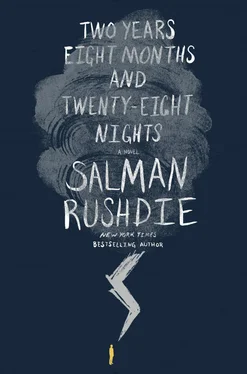Being a man of reason, he did not guess that she was a supernatural creature, a jinnia, of the tribe of female jinn, the jiniri: a grand princess of that tribe, on an earthly adventure, pursuing her fascination with human men in general and brilliant ones in particular. He took her into his cottage as housekeeper and lover and in the muffled night she whispered her “true”—that is to say, false — Jewish name into his ear and that was their secret. Dunia the jinnia was as spectacularly fertile as her prophecy had implied. In the two years, eight months and twenty-eight days and nights that followed, she was pregnant three times and on each occasion brought forth a multiplicity of children, at least seven on each occasion, it would appear, and on one occasion eleven, or possibly nineteen, though the records are vague and inexact. All the children inherited her most distinctive feature: they had no earlobes.
If Ibn Rushd had been an adept of the occult arcana he would have realized then that his children were the offspring of a nonhuman mother, but he was too wrapped up in himself to work it out. (We sometimes think that it was fortunate for him, and for our entire history, that Dunia loved him for the brilliance of his mind, his nature being perhaps too selfish to inspire love by itself.) The philosopher who could not philosophize feared that his children would inherit, from him, the sad gifts which were his treasure and his curse. “To be thin-skinned, far-sighted, and loose-tongued,” he said, “is to feel too sharply, see too clearly, speak too freely. It is to be vulnerable to the world when the world believes itself invulnerable, to understand its mutability when it thinks itself immutable, to sense what’s coming before others sense it, to know that the barbarian future is tearing down the gates of the present while others cling to the decadent, hollow past. If our children are fortunate they will only inherit your ears, but regrettably, as they are undeniably mine, they will probably think too much too soon, and hear too much too early, including things that are not permitted to be thought or heard.”
“Tell me a story,” Dunia often demanded in bed in the early days of their cohabitation. He quickly discovered that in spite of her seeming youth she could be a demanding and opinionated individual, in bed and out of it. He was a big man and she was like a little bird or stick insect but he often felt she was the stronger one. She was the joy of his old age but demanded from him a level of energy that was hard for him to maintain. At his age sometimes all he wanted to do in bed was sleep, but Dunia saw his attempts to nod off as hostile acts. “If you stay up all night making love,” she said, “you actually feel better rested than if you snore for hours like an ox. This is well known.” At his age it wasn’t always easy to enter into the required condition for the sexual act, especially on consecutive nights, but she saw his elderly difficulties with arousal as proofs of his unloving nature. “If you find a woman attractive there is never a problem,” she told him. “Doesn’t matter how many nights in a row. Me, I’m always horny, I can go on forever, I have no stopping point.”
His discovery that her physical ardor could be quelled by narrative had provided some relief. “Tell me a story,” she said, curling up under his arm so that his hand rested on her head, and he thought, Good, I’m off the hook tonight; and gave her, little by little, the story of his mind. He used words many of his contemporaries found shocking, including “reason,” “logic” and “science,” which were the three pillars of his occultist arcana, the ideas that had led his books to be burned. Dunia was afraid of these words but her fear excited her and she snuggled in closer and said, “Hold my head when you’re filling it with your lies.”
There was a deep, sad wound in him, because he was a defeated man, had lost the great battle of his life to a dead Persian, Ghazali of Tus, an adversary who had been dead for eighty-five years. A hundred years ago Ghazali had written a book called The Incoherence of the Philosophers, in which he attacked Greeks like Aristotle, the Neoplatonists, and their allies, Ibn Rushd’s great precursors Ibn Sina and al-Farabi. At one point Ghazali had suffered a crisis of belief but had returned to become the greatest scourge of philosophy in the history of the world. Philosophy, he jeered, was incapable of proving the existence of God, or even of proving the impossibility of there being two gods. Philosophy believed in the inevitability of causes and effects, which was a diminution of the power of God, who could easily intervene to alter effects and make causes ineffectual if he so chose.
“What happens,” Ibn Rushd asked Dunia when the night wrapped them in silence and they could speak of forbidden things, “when a lighted stick is brought into contact with a ball of cotton?”
“The cotton catches fire, of course,” she answered.
“And why does it catch fire?”
“Because that is the way of it,” she said, “the fire licks the cotton and the cotton becomes part of the fire, it’s how things are.”
“The law of nature,” he said, “causes have their effects,” and her head nodded beneath his caressing hand.
“He disagreed,” Ibn Rushd said, and she knew he meant the enemy, Ghazali, the one who had defeated him. “He said that the cotton caught fire because God made it do so, because in God’s universe the only law is what God wills.”
“So if God had wanted the cotton to put out the fire, if he wanted the fire to become part of the cotton, he could have done that?”
“Yes,” said Ibn Rushd. “According to Ghazali’s book, God could do that.”
She thought for a moment. “That’s stupid,” she said, finally. Even in the dark she could feel the resigned smile, the smile with cynicism in it as well as pain, spread crookedly across his bearded face. “He would say that it was the true faith,” he answered her, “ and that to disagree with it would be … incoherent.”
“So anything can happen if God decides it’s okay,” she said. “A man’s feet might no longer touch the ground, for example — he could start walking on air.”
“A miracle,” said Ibn Rushd, “is just God changing the rules by which he chooses to play, and if we don’t comprehend it, it is because God is ultimately ineffable, which is to say, beyond our comprehension.”
She was silent again. “Suppose I suppose,” she said at length, “that God may not exist. Suppose you make me suppose that ‘reason,’ ‘logic’ and ‘science’ possess a magic that makes God unnecessary. Can one even suppose that it would be possible to suppose such a thing?” She felt his body stiffen. Now he was afraid of her words, she thought, and it pleased her in an odd way. “No,” he said, too harshly. “That really would be a stupid supposition.”
He had written his own book, The Incoherence of the Incoherence, replying to Ghazali across a hundred years and a thousand miles, but in spite of its snappy title the dead Persian’s influence was undiminished and finally it was Ibn Rushd who was disgraced, whose book was set on fire, which consumed the pages because that was what God decided at that moment that the fire should be permitted to do. In all his writing he had tried to reconcile the words “reason,” “logic” and “science” with the words “God,” “faith” and “Qur’an,” and he had not succeeded, even though he used with great subtlety the argument from kindness, demonstrating by Qur’anic quotation that God must exist because of the garden of earthly delights he had provided for mankind, and do we not send down from the clouds pressing forth rain, water pouring down in abundance, that you may thereby produce corn, and herbs, and gardens planted thick with trees? He was a keen amateur gardener and the argument from kindness seemed to him to prove both God’s existence and his essentially kindly, liberal nature, but the proponents of a harsher God had beaten him. Now he lay, or so he believed, with a converted Jew whom he had saved from the whorehouse and who seemed capable of seeing into his dreams, where he argued with Ghazali in the language of irreconcilables, the language of wholeheartedness, of going all the way, which would have doomed him to the executioner if he had used it in waking life.
Читать дальше












